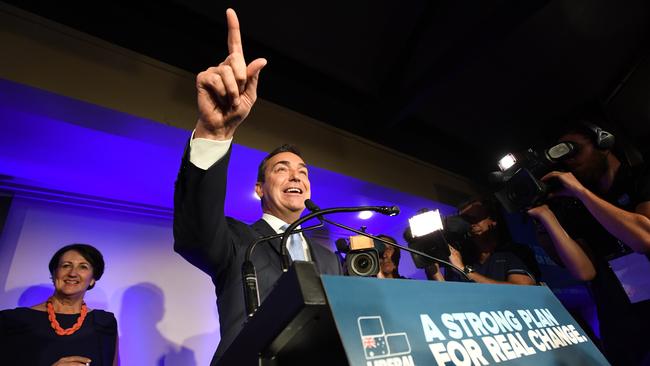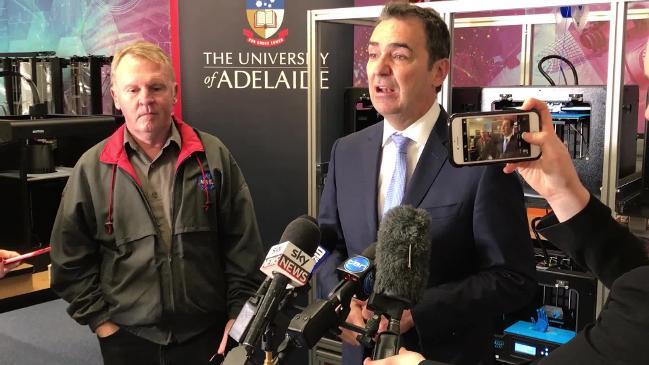In review: The first 100 days of Steven Marshall’s Liberal Government
THE Government gets a mandate. The crossbench gets a mandate. Everyone gets a mandate. State political editor Daniel Wills analyses the first 100 days of Liberal government in SA.

SA News
Don't miss out on the headlines from SA News. Followed categories will be added to My News.
CRITICAL crossbenchers have warned they won’t just “rubber stamp” the State Government’s reform agenda, and claimed their own mandate to keep faith with voters who elected them.
Premier Steven Marshall was this week forced to concede he would not meet a pre-election pledge to have legislation for the deregulation of shop trading hours in Parliament within the first 100 days of forming government, a self-imposed deadline that expires next week. However, he’s insisted the Government is taking action on “every single one” of the promises it made before the election and expected to deliver all other pledges on the 100-day checklist.
“It’s been an extraordinarily busy Parliament so far,” he said.
“We are sitting late virtually every single night to get through the bold program that the Government has in place.
“We are loving it. We are loving fixing up the mess that we inherited. We’re not complaining about it, we’re getting on with getting SA moving in the right direction.
“We are going to be a government that delivers.”
Promises already delivered include introducing council rate-capping legislation to Parliament, slashing Emergency Services Levy bills and pushing ahead with payroll tax reform.
However, the Government faces political obstacles in the Upper House as shop-trading deregulation and rate capping are yet to secure a crossbench majority needed to become law.
In the days after the election, Mr Marshall urged all rival parties to get on board with his “mandate” and approve policies he said the state voted for.
SA Best MP Frank Pangallo said: “I’ve had a look at the constitution, and there is nothing in there that carries the word ‘mandate’.”

“We had 220,000 votes,” Mr Pangallo said. “Our people voted us in on our policies. Just because they got voted on to government doesn’t mean we truck everything through.
“Over the years, there’s been a mix of independents and smaller parties in there. People want a house of review. That’s why they put us there.
“We’re not just a rubber stamp. We won’t just let them bulldoze their policies through.”
Greens MP Mark Parnell said more than 60 per cent of voters backed a collection of parties that opposed expanded trading hours, and their representatives had a right to hold firm.
“Everyone who was elected has a mandate from those who elected them to pursue the agenda that they put in the lead-up up to the election,” he said.
“From a Greens point of view, I don’t think anyone was in too much doubt about what we said we stood for. We were clear.
“The only wriggle room, if that’s the right word, is to see the detail. We always reserve the right to have a look at tweaking things, but within the broad parameters of our positions.”
Independent MP John Darley, currently entering the second half of an eight year term, said his job was to review the Government’s legislation for mistakes and bad consequences.
“If it’s not right, then we change it,” he said.
“To claim a ‘mandate’ is just presumptuous.”
After the fall, it’s hard to hit ground running
LABOR is enduring arguably its toughest period since a demolition at the State Bank election 25 years ago. After an incredible period of political success and four straight election wins, the new Opposition is having to regroup and reposition for a fresh run in four years’ time.
To date, Labor has largely made the most from the very modest spoils of opposition.
It is straight-jacketed from making major headway on the biggest issues confronting the state.
Any attack on energy prices, health reform or employment and economy is met with an easy and ferocious retort that Labor left everything in a mess upon falling from power.
But Opposition Leader Peter Malinauskas, pictured, and his new-look team have staked out ground on key law-and-order issues like keeping paedophiles in prison and freeway rock throwing.
Labor has also achieved a cosmetic reform that is the precursor to bigger and necessary change.
Mr Malinauskas has elevated former education minister Susan Close as his deputy and appointed a youthful treasury spokesman in Stephen Mullighan. New MPs Jayne Stinson and Blair Boyer have taken prominent roles, and injected themselves into the media debate.
Labor has an enthusiasm and purpose, which could have easily faded after an election loss, and could soon have a big base-rallying win by stopping plans for more shopping hours.
But to be truly competitive, Labor at some point will have to make a dramatic break from the old order. Mr Malinauskas will have to confront, and repudiate, failed and unpopular policies of the former government and make a clear public declaration of how he would be different.
His current “listening tour” is a mechanism designed to permit this substantial pivot.
It will be a very difficult task. Former premier Jay Weatherill remains on the back bench, with a legacy of successful political leadership that Mr Malinauskas will rightly want to respect.
But the election clearly showed that the public believed an agenda of higher taxes, bigger government and constant conflict was not fit for SA at this time in its history. It viewed the moral failures and administrative catastrophes at Oakden and in child protection with disgust.
Voters felt arrogance and insularity captured the government as it drifted from core functions.
Labor’s first 100 days boasts small wins on some day-to-day politics. To get back in the main game, it will need a dramatic narrative shift that’s delivered with brute force and laser focus.
Slow and steady steps in cautious revolution
PREMIER Steven Marshall wants to make quiet achievement his hallmark, and has his first report card coming soon as the clock runs down on a self-imposed 100-day deadline.
The main purpose of announcing such a plan is pure campaigning.
After 16 years out of power, and a time of tumult and division when they last held office, the Liberals had to counter lingering public doubts about their ability to actually get anything done.
It’s unlikely that many voters read the 100-day plan, released in the final month of the campaign, in detail.
But the fact that Mr Marshall had one at all, and was carrying it under his arm for every photo opportunity, was probably good enough to convince many that he was serious.
A lot of the promises are cleverly qualified, and only commit the State Government to getting started on serious work, rather than completing it in full.
Some of the biggest ones, including cutting Emergency Services Levy bills and payroll tax legislation, are done.
Shop trading laws won’t make it to Parliament in time, and expect a rush of others in the coming week.
But one of the most significant changes to state politics that Mr Marshall is trying to implement won’t be found in the plan directly. It will be decided by what is done out of it.
Mr Marshall senses that two big reasons for Labor’s fall were constant changes in policy direction – such as the launching and dumping of nuclear waste plans or surprise tax increases revealed on Budget days – and its desire to lead the media cycle every day.
He wants the contrast of being a new government that says what it means and does what it says while keeping a lower public profile, rolling up the sleeves and just getting to work.
In Parliament, it’s clear that the duck is paddling hard under the water line.
There has been a rush of legislation put into the house since sitting resumed in May.
Much of it is sensible and uncontroversial, with the big showdowns on shops and local-government rate capping yet to come.
Some insider criticism suggests that this lack of sizzle could become a problem as the Government struggles to inject itself into the popular mind on a daily basis.
But Mr Marshall and his ministers seem very content and are taking a long-term view.
They are confident that an all-bran diet of smaller government, light-touch regulation and lower taxes will provide a return on investment as they reappear on stage at an election in four years with results to show.


